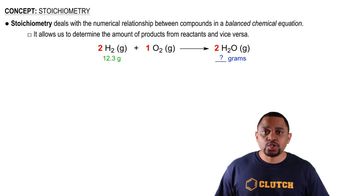Consider the following equilibrium: 2 H2(g) + S2(g) ⇌ 2 H2S(g) Kc = 1.08 × 107 at 700°C (b) Does the equilibrium mixture contain mostly H2 and S2 or mostly H2S?
At 1000 K, 𝐾𝑝 = 1.85 for the reaction SO2(𝑔) + 12 O2(𝑔) ⇌ SO3(𝑔) (c) What is the value of 𝐾𝑐 for the reaction in part (b)?
 Verified step by step guidance
Verified step by step guidance
Verified video answer for a similar problem:
Key Concepts
Equilibrium Constant (Kp and Kc)

Relationship between Kp and Kc

Stoichiometry of the Reaction

Consider the following equilibrium: 2 H2(g) + S2(g) ⇌ 2 H2S(g) Kc = 1.08 × 107 at 700°C (c) Calculate the value of 𝐾𝑐 if you rewrote the equation H2(g) + 1/2 S2(g) ⇌ H2S(g)
At 1000 K, 𝐾𝑝 = 1.85 for the reaction SO2(𝑔) + 1/2 O2(𝑔) ⇌ SO3(𝑔) (a) What is the value of Kp for the reaction SO3(𝑔) ⇌ SO2(𝑔) + 1/2 O2(𝑔)? (b) What is the value of Kp for the reaction 2 SO2(𝑔) + O2(𝑔) ⇌ 2 SO3(𝑔)?
Consider the following equilibrium, for which at 𝐾𝑝 = 0.0752 at 480°C: 2 Cl2(𝑔) + 2 H2O(𝑔) ⇌ 4 HCl(𝑔) + O2(𝑔) (a) What is the value of 𝐾𝑝 for the reaction 4 HCl(𝑔) + O2(𝑔) ⇌ 2 Cl2(𝑔) + 2 H2O(𝑔)?
The following equilibria were attained at 823 K:
CoO(s) + H2(g) → Co(s) + H2O(g) Kc = 67
CoO(s) + CO(g) → Co(s) + CO2(g) Kc = 490
Based on these equilibria, calculate the value of 𝐾𝑐 for H2(𝑔) + CO2(𝑔) ⇌ CO(𝑔) + H2O(𝑔) at 823 K.
Consider the equilibrium N2(𝑔) + O2(𝑔) + Br2(𝑔) ⇌ 2 NOBr(𝑔) Calculate the equilibrium constant 𝐾𝑝 for this reaction, given the following information at 298 K:
2 NO(𝑔) + Br2(𝑔) ⇌ 2 NOBr(𝑔) 𝐾𝑐 = 2.02
NO(𝑔) ⇌ N2(𝑔) + O2(𝑔) 𝐾𝑐 = 2.1×1030
